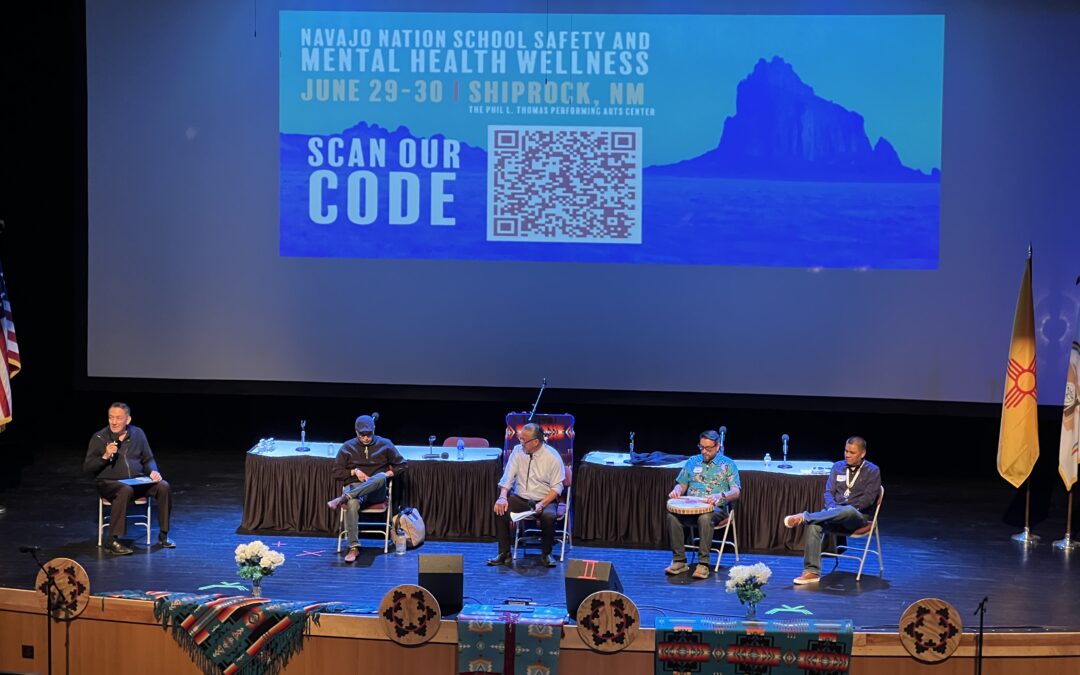The Navajo Nation Department of Diné Education (DODE) in partnership with Central Consolidated School District, Kayenta School District, the Navajo Nation Police Department, first responders, community leaders, education leaders, and stakeholders hosted the first Navajo Nation School Safety and Mental Health Wellness Summit from June 29-30.
Attendees convened at the Phil Thomas Performing Arts Center and Shiprock High School in Shiprock, New Mexico for the two-day summit which saw panel discussions from safety leaders and elected officials on topics that impact Navajo Nation student safety on a daily basis.
“We convened our leadership to discuss two important topics: safety and health. We’re here to provide information, solutions, and resolutions. We should all want to, have to, be involved already,” Safety Summit Organizer and DODE Office of Diné School Improvement Program Manager Ferlin Clark said in his welcoming remarks.
NEED FOR THE SUMMIT
The Navajo Nation School Health and Safety Task Force was formed following a security incident in Kayenta School District in April. A social media threat was issued on April 3 at Newcomb High School in Newcomb, New Mexico and the suspect was arrested.
Following transport to Northern Navajo Medical Center in Shiprock for clearance, the suspect was transported to the Navajo Nation Corrections Facility in Kayenta, Arizona and subsequently released into the community on April 4. The suspect then gained entrance into Kayenta High School before being arrested once more.
After the incident was brought to the attention of Dr. Clark, Navajo Nation President Buu Nygren, Navajo Nation Vice President Richelle Montoya, and Navajo Nation Council Delegate Shaandiin Parrish, DODE leaders and various Navajo Nation officials and community leaders convened at a series of meetings to provide insight and recommendations on how they can improve the security in schools to better protect Navajo students and teachers.
“Security incidents like this are not a matter of if they happen, but when they happen. That is the reason this task force was formed,” Navajo Nation Chief of Police Daryl Noon said at the summit.
PANELS, TRAINING, DISCUSSIONS
The summit began June 29 with the Elected & Education Officials Panel that included Vice President Montoya, Deputy Associate Superintendent of the Office of Indian Education Lynnann Yazzie, and New Mexico Public Education Department School Board Commission Representative Sharon Clahchischilliage.
Law enforcement leaders hosted a safety training panel. Speakers included Dr. Kirk Carpenter of Carpenter Consulting, Navajo Nation Police Commander Donnie Kee, and Grant Banash of POMS & Associates, Safety and Risk Management.
Speakers at a panel highlighting the top safety issues and needs for Navajo schools included DODE Assistant Superintendent of Head Start Roy Tracy, Gallup-McKinley County Schools Superintendent Mike Hyatt, Navajo Preparatory School Head of School Shawna Becenti, Kayenta Unified School District Superintendent Lemual Adson, BIE School Safety Specialist Savannah Six, Shiprock Associated Schools Inc. Acting Executive Director Dr. J Kaibah Begay, Kirk Carpenter, and several Navajo Preparatory School students.
The June 30 session included individual breakout sessions covering nine key areas for immediate action, policy changes, financial support, and collaboration:
- Communication
- Law and Order
- Essential Skills/Resources
- Mental Health
- Post-Threat Response & Recovery
- Infrastructure
- Budget and Funding
- Training
- School Safety Resource Center
Summit attendees received and shared information and insight to help the task force develop a work plan and recommendations to government officials so they may collaborate with school officials to become proactive in implementing solutions to improve mental health wellbeing of Navajo students and better prepare for and respond to future threats.
“We need to learn how to prevent trauma rather than deal with it. We need to put aside our differences for the betterment of our students,” Council Delegate Dr. Andy Nez said.

